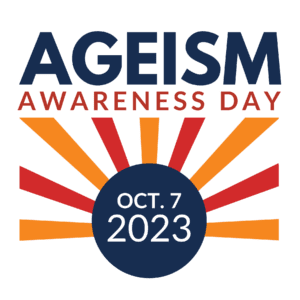 Today, October 7, 2023, is Ageism Awareness Day. Ageism refers to the stereotypes (how we think), prejudice (how we feel), and discrimination (how we act) toward others or oneself based upon age. The reason that it is essential to understand ageism is because ageist stereotypes are a chronic stressor in the lives of older adults.
Today, October 7, 2023, is Ageism Awareness Day. Ageism refers to the stereotypes (how we think), prejudice (how we feel), and discrimination (how we act) toward others or oneself based upon age. The reason that it is essential to understand ageism is because ageist stereotypes are a chronic stressor in the lives of older adults.
The stereotypes, prejudices, and discrimination resulting from ageism cause lower self-perceptions of aging and adversely impact the behavior and health of older adults. Furthermore, these negative attitudes and beliefs about aging can lead to impaired cognitive performance and even predict the development of Alzheimer’s disease biomarkers.
Ageism can also shorten a lifespan by 7.5 years, according to a 2002 study by Becca Levy. Conversely, individuals with a more positive self-perception of aging lived an average of 7.5 years longer than those with less positive self-perceptions. Similarly, older adults with a positive age belief and dementia risk factors were nearly 50% less likely to develop the disease than their peers who held negative beliefs. Thus, a positive view of aging directly affects overall health.
Here are six myths about old age that promote ageism.
-
-
Old age is a disease, a disaster.
-
Older adults are mindless.
-
Older adults are sexless.
-
Older adults are useless.
-
Older adults are powerless.
-
All older adults are alike.
-
These negative stereotypes and representations are often promulgated in advertisements, television, and movies. Nevertheless, we can all begin to offset these incorrect perceptions of older adults by reframing these messages, thereby decreasing the implicit bias toward older adults.
I began my work in geriatrics when I was a senior clinical psychologist and neuropsychological assessor at Santa Clara Valley Health and Hospital system over a decade ago. During that time, I witnessed firsthand how these negative stereotypes affected the wellbeing of my patients. Working with so many older adults, I assure you they are a vital and important part of society. They make countless contributions and represent a meaningful and growing segment of our population.
Today, in my private practice, I continue to work with many older adults by performing cognitive assessments and offering therapy to them and their caregivers. As our population is aging, I am seeing more older adults coming into my office who are suffering from ageism. Therefore, on this Ageism Awareness Day, I want to bring this issue to the forefront and encourage all of us to consider how we treat older adults and how we want to be treated as we age.
I am text block. Click edit button to change this text.

